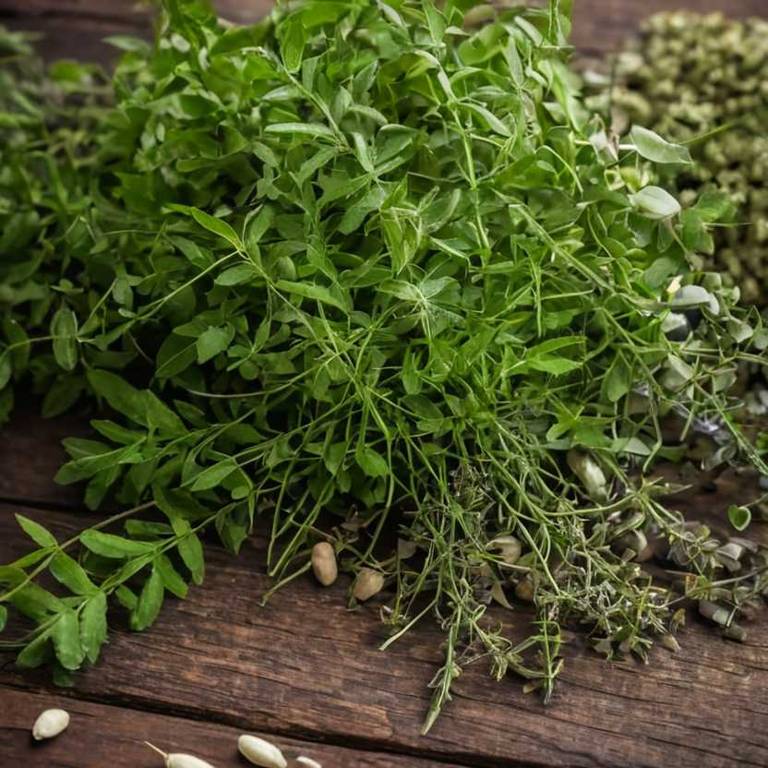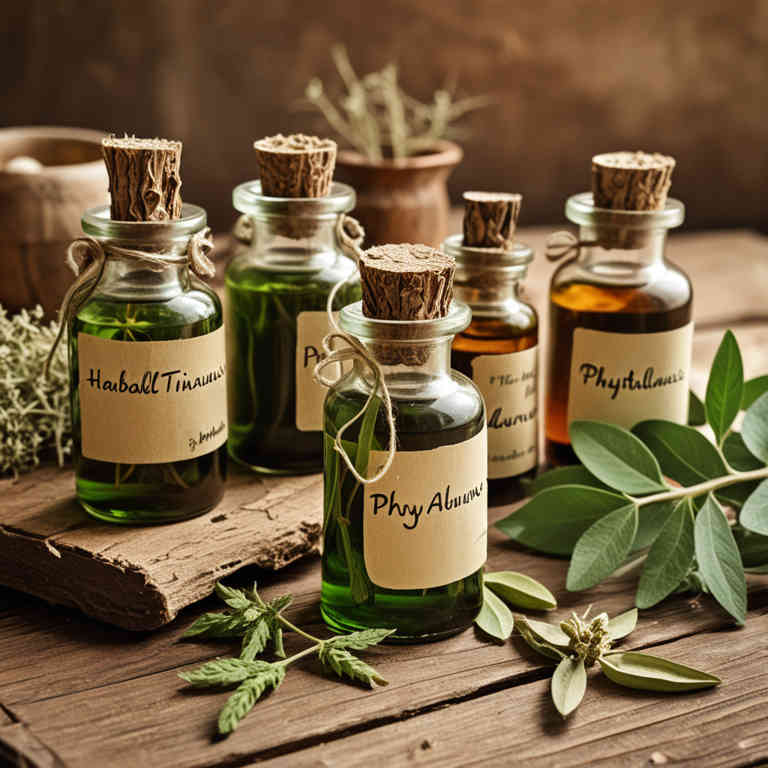10 Best Phyllanthus Amarus Preparations

The best medicinal preparations of Phyllanthus amarus are teas, decoctions, tinctures, capsules, and creams, each offering unique benefits for various health conditions.
Teas and decoctions are commonly used to support liver function and treat urinary tract infections.
Tinctures provide a concentrated form for quick absorption and are often used for their antiviral properties.
Capsules offer a convenient and standardized dosage, making them popular for daily supplementation.
Creams are applied topically to address skin conditions and inflammation, showcasing the versatility of this valuable herb.
Below there's a list of the 10 best herbal preparations of phyllanthus amarus for medicinal purposes.
- 1. Teas
- 2. Decoctions
- 3. Tinctures
- 4. Capsules
- 5. Creams
- 6. Juices
- 7. Lozenges
- 8. Oils
- 9. Poultices
- 10. Syrups
1. Teas
Phyllanthus amarus teas is commonly used to support liver health, treat urinary tract infections, and manage diabetes.
This herbal preparation is also used for its anti-inflammatory and antioxidant properties, helping to alleviate symptoms of inflammation and oxidative stress. The most common ailments treated with Phyllanthus amarus include liver disorders, kidney stones, and metabolic conditions. The bioactive constituents responsible for its medicinal effects include flavonoids, alkaloids, saponins, and tannins, which contribute to its hepatoprotective, diuretic, and antidiabetic actions.
These compounds work synergistically to provide the plant's therapeutic benefits.

2. Decoctions
Phyllanthus amarus decoctions is commonly used to treat liver disorders, urinary tract infections, and as an antiviral agent.
It is also utilized for its anti-inflammatory and antioxidant properties. The decoctions are often prepared by boiling the dried leaves or roots in water to extract the active compounds. Common ailments addressed include hepatitis, kidney stones, and gastrointestinal issues.
The bioactive constituents responsible for these effects include flavonoids, tannins, alkaloids, and saponins, which contribute to its therapeutic actions.

3. Tinctures
Phyllanthus amarus tinctures is commonly used to treat liver disorders, urinary tract infections, and kidney stones due to its detoxifying and anti-inflammatory properties.
These tinctures are also used for their antiviral effects, particularly against hepatitis B virus, and for supporting overall liver health. The most common medicinal uses include managing jaundice, reducing inflammation, and promoting urinary tract health. The bioactive constituents responsible for these effects include flavonoids, saponins, alkaloids, and tannins, which exhibit antioxidant, anti-inflammatory, and antimicrobial activities.
These compounds work synergistically to enhance the therapeutic benefits of the tinctures.

4. Capsules
Phyllanthus amarus capsules is commonly used to support liver health, treat hepatitis, and promote urinary tract wellness.
These capsules are widely utilized in traditional medicine to address ailments such as liver inflammation, kidney stones, and urinary infections. The most common medicinal uses include the management of hepatitis B, detoxification support, and the treatment of urinary tract disorders. The bioactive constituents responsible for its medicinal properties include flavonoids, alkaloids, tannins, and saponins, which exhibit antioxidant, anti-inflammatory, and antimicrobial effects.
These compounds contribute to the plant’s ability to support organ function and enhance immune response.

5. Creams
Phyllanthus amarus creams is commonly used to treat skin conditions and inflammatory disorders due to its antimicrobial and anti-inflammatory properties.
These creams are frequently applied for ailments such as eczema, psoriasis, fungal infections, and wounds. The bioactive constituents responsible for these effects include flavonoids, tannins, alkaloids, and saponins, which exhibit antioxidant, antimicrobial, and anti-inflammatory activities. Additionally, the plant's compounds may support immune function and help in reducing skin irritation.
This herbal preparation is valued in traditional medicine for its natural therapeutic benefits.

6. Juices
Phyllanthus amarus juices is commonly used to treat liver disorders, hepatitis, and other digestive ailments due to its detoxifying and hepatoprotective properties.
It is also used in traditional medicine to manage diabetes, inflammation, and urinary tract infections. The juice is believed to support kidney function and may help in the treatment of kidney stones. The bioactive constituents responsible for these effects include flavonoids, alkaloids, saponins, and tannins, which have antioxidant, anti-inflammatory, and antimicrobial properties.
These compounds contribute to the plant's ability to support organ health and reduce oxidative stress in the body.

7. Lozenges
Phyllanthus amarus lozenges is commonly used to treat oral infections, sore throat, and other respiratory ailments due to their antimicrobial and anti-inflammatory properties.
These lozenges are often employed in traditional medicine to alleviate symptoms of colds, coughs, and mouth ulcers. The bioactive constituents responsible for these effects include flavonoids, tannins, alkaloids, and saponins, which exhibit antimicrobial, antioxidant, and immunomodulatory activities. Additionally, they may help reduce inflammation and promote healing of mucous membranes.
This herbal preparation is valued for its natural approach to managing common ailments affecting the throat and respiratory system.

8. Oils
Phyllanthus amarus oils is commonly used to treat liver disorders, infections, and inflammatory conditions.
It is often employed in traditional medicine to support liver function and detoxification. The oil is also used for its antimicrobial and anti-inflammatory properties. The bioactive constituents include flavonoids, tannins, alkaloids, and saponins, which contribute to its therapeutic effects.
These compounds help in reducing inflammation, fighting bacterial and viral infections, and supporting overall immune health.

9. Poultices
Phyllanthus amarus poultices is commonly used to treat various inflammatory and skin-related conditions, such as wounds, infections, and skin irritations.
These poultices are also traditionally applied to alleviate symptoms of malaria and liver disorders due to their purported detoxifying and antimalarial properties. The most common medicinal uses include reducing inflammation, promoting wound healing, and addressing gastrointestinal issues like dysentery. The bioactive constituents responsible for these effects include flavonoids, tannins, alkaloids, and saponins, which exhibit antimicrobial, anti-inflammatory, and hepatoprotective activities.
These compounds work synergistically to provide the plant's therapeutic benefits in traditional medicine.

10. Syrups
Phyllanthus amarus syrups is commonly used to support liver health, treat urinary tract infections, and manage diabetes.
This herbal preparation is widely utilized for its antiviral, anti-inflammatory, and hepatoprotective properties. It is often prescribed to alleviate symptoms of hepatitis, kidney stones, and metabolic disorders. The bioactive constituents include flavonoids, alkaloids, saponins, and tannins, which contribute to its therapeutic effects.
These compounds help in detoxification, antimicrobial activity, and regulation of blood sugar levels.
